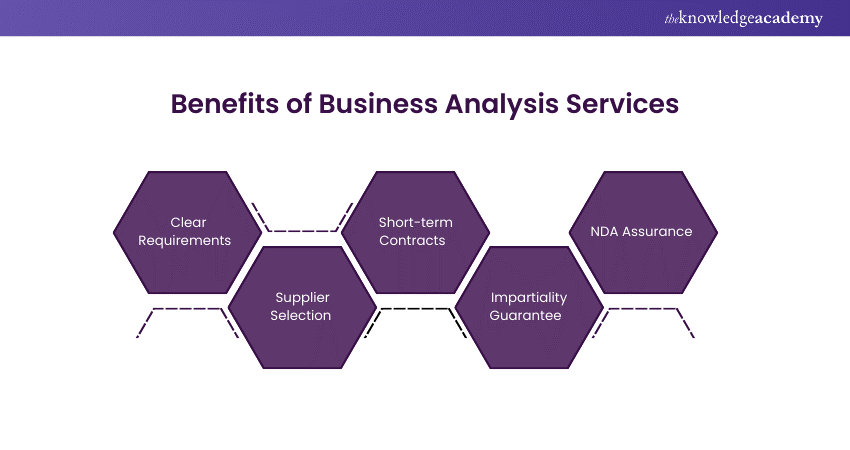We may not have the course you’re looking for. If you enquire or give us a call on +27 800 780004 and speak to our training experts, we may still be able to help with your training requirements.
Training Outcomes Within Your Budget!
We ensure quality, budget-alignment, and timely delivery by our expert instructors.

Staying ahead means constantly evolving and developing fresh ideas in the fast-paced business world. Business Analysis is a game-changer, helping companies spot chances to get better and making things run smoother. It’s all about unlocking a company’s hidden strengths and hitting those big-picture targets. Let’s dive into the world of Business Analysis Services and uncover what makes them so crucial in today’s business scene.
Table of Contents
1) Understanding Business Analysis Services
2) Factors of Business Analysis Services
3) Business Analysis Services Benefits
4) When Should You Consider Conducting a Business Analysis?
5) Conclusion
Understanding Business Analysis Services
Business Analysis Services are a comprehensive suite of activities aimed at comprehending the specific requirements of a business. They involve the identification of potential solutions and the facilitation of their effective execution. Generally, these services are categorised into four distinct stages:
1) Discover
The discovery phase is about comprehending the business’s present situation. It involves collecting requirements and pinpointing crucial stakeholders. Business Analysts engage in interviews, surveys, and workshops to amass pertinent data. The objective is to thoroughly understand the business environment and pinpoint improvement opportunities.
2) Develop
During the development phase, the emphasis is on scrutinising the gathered data and crafting potential solutions. Analysts employ tools like SWOT, gap, and root cause analyses to evaluate various alternatives. Brainstorming sessions, feasibility studies, and initial design efforts are undertaken to formulate practical solutions.
3) Define
The definition phase is pivotal for detailing the project’s specific requirements and scope. Analysts collaborate with stakeholders to establish clear, quantifiable goals and comprehensive specifications. This involves drafting use cases, user stories, and functional requirement documents to align all parties with the project’s scope and needs.
4) Delivery
The delivery phase is about executing the proposed solutions and verifying they fulfill the established criteria. Analysts oversee the development process, conduct user acceptance testing, and mediate between stakeholders and developers. The focus is on the successful rollout of solutions to achieve the intended business results.
Factors of Business Analysis Services
Several factors contribute to the effectiveness of Business Analysis Services. Understanding these factors can help organisations maximise the value of their Business Analysis efforts.
1) Requirement Audit
A thorough requirement audit is essential for verifying the accuracy and completeness of the collected requirements. This process is instrumental in identifying any discrepancies, ensuring that all stakeholder needs are met, and that they are in harmony with the overarching business goals.
Enhance your career prospects with our BCS Foundation Certificate in Agile - sign up today and advance your career!
2) Opportunity Identification
Business Analysts excel at pinpointing opportunities for enhancement and innovation. By analysing market trends, customer feedback, and internal processes, they can reveal potential areas for growth and increased efficiency.
3) Risk Assessment
Risk assessment is a vital aspect of Business Analysis. Analysts identify and evaluate potential risks that could affect the project or organisation. They assess the likelihood and impact of each risk and devise strategies to mitigate them, aiming to reduce their potential effects.
4) Prototyping Support
Prototyping support is about creating preliminary versions or prototypes of the proposed solution to test concepts and gather stakeholder feedback. This iterative process aids in refining the solution to ensure it meets user expectations prior to full-scale development.
5) User Flows
User flows chart the steps users take to accomplish a task or process. Business Analysts craft these flows to visualise the user experience, pinpointing any potential obstacles or inefficiencies to design more intuitive and user-centric solutions.
6) Engineering Requirements
Engineering requirements outline the technical specifications and limitations for the proposed solution. Business Analysts collaborate with technical teams to confirm the solution’s technical viability and ensure it conforms to the organisation’s architectural standards.
7) Development Support
Business Analysts provide continuous support during the development phase, ensuring that the project adheres to its requirements and objectives. This includes regular communication with development teams, addressing issues as they arise, and maintaining alignment with project goals.
8) Project Documentation
Comprehensive documentation is crucial for successful project management. Business Analysts are responsible for creating and updating detailed documentation, such as requirements specifications, design documents, test plans, and user manuals, serving as a reference for all stakeholders throughout the project lifecycle.
9) Performance Monitoring
Performance monitoring tracks the progress and effectiveness of the implemented solution against set objectives. Business Analysts employ Key Performance Indicators (KPIs) and other metrics to evaluate the solution’s performance and identify opportunities for further enhancement.
Stand out in the competitive job market by earning the BCS Foundation Certificate in IS Project Management – register now!
Business Analysis Services Benefits
Business Analysis Services provide numerous advantages that can significantly boost an organisation’s efficiency, decision-making capabilities, and overall success. Here are the specific benefits of these services:

1) Clear Requirements
Business Analysis Services ensure the establishment of clear and well-documented requirements. This clarity fosters a shared understanding among all stakeholders regarding project goals and deliverables, leading to:
a) Fewer misunderstandings.
b) Reduced miscommunications.
c) Realistic expectations for project outcomes.
d) A more streamlined development process, saving time and resources.
2) Supplier Selection
These services play a crucial role in the supplier selection process. Analysts evaluate potential suppliers based on specific criteria to ensure they can effectively meet the business’s needs. This includes:
a) Assessing supplier capabilities and performance history.
b) Conducting cost-benefit analyses.
c) Determining the best value.
d) Ensuring alignment with business objectives and regulatory requirements.
3) Short-term Contracts
Business Analysis Services offer short-term contracts that are advantageous for businesses looking for quick solutions or addressing immediate challenges. These contracts enable companies to:
a) Utilise specialised expertise for short-term projects.
b) Test new strategies or solutions without long-term commitments.
c) Quickly adapt to changing market conditions.
d) Adjust to evolving business needs.
4) Impartiality Guarantee
Impartiality is essential for effective Business Analysis Services. By providing an unbiased perspective, Business Analysts can:
a) Offer objective assessments of business processes and systems.
b) Recommend solutions based solely on the best interests of the business.
c) Avoid internal biases that might affect judgment or decision-making.
5) NDA Assurance
Confidentiality is paramount when handling sensitive business information. Business Analysis services typically include Non-Disclosure Agreements (NDAs) to:
a) Protect proprietary information and intellectual property
b) Ensure that sensitive data remains secure and is used only for its intended purpose.
c) Build trust between the business and the analysis service provider
Master the skills to analyse business processes with our BCS Foundation Certificate in Business Analysis – sign up now!
When Should You Consider Conducting Business Analysis?
Business Analysis is a strategic tool that can be employed in various situations to enhance organisational performance and decision-making. Here are the scenarios where conducting Business Analysis is particularly advantageous:
1) Initiating a New Project: Before embarking on a new project, it’s crucial to conduct Business Analysis to define clear goals and requirements. This step is essential to prevent scope creep and to set the stage for project success.
2) Addressing Operational Challenges: When operational challenges arise, Business Analysis can help identify bottlenecks and inefficiencies. By addressing these issues, organisations can improve their overall performance.
3) Navigating Growth or Change: During periods of growth or significant change, Business Analysis assists in aligning new initiatives with the organisation’s strategic objectives, ensuring that the expansion or pivot is managed effectively.
4) Maintaining Competitive Edge: To remain competitive in a rapidly changing market, organisations should regularly conduct Business Analysis to assess and update their business processes.
5) Integrating New Technology: When implementing new technology, Business Analysis is vital for understanding its impact on existing processes and systems. This ensures that the technology is integrated smoothly and that its benefits are fully realised.
Conclusion
We hope you enjoyed reading our blog. Hoping it answered all your questions related Business Analysis Services, and why it is important in helping your organisation. By consistently engaging in Business Analysis, companies can uncover avenues for enhancement, ensure project alignment with overarching objectives, avert potential risks, and maintain a competitive edge. Whether embarking on a fresh venture, navigating operational hurdles, or integrating novel technologies, Business Analysis offers the critical insights necessary to foster strategic expansion and realise your business aspirations.
Gain the skills to lead effective change initiatives with our BCS Foundation Certificate in Business Change - start your journey today!
Frequently Asked Questions

SWOT analysis helps businesses strategies by identifying strengths to leverage, weaknesses to improve, opportunities to explore, and threats to mitigate. This technique guides decision-making and strategic planning.

Threats are certain factors that can potentially harm an organisation. A threat combined with weakness is a risk. Examples of threats include rising material costs, tight labour supply, increasing competition, failure to get approvals, supply chain breakdowns, legal/regulatory issues, weather/natural disasters, etc.

The Knowledge Academy takes global learning to new heights, offering over 30,000 online courses across 490+ locations in 220 countries. This expansive reach ensures accessibility and convenience for learners worldwide.
Alongside our diverse Online Course Catalogue, encompassing 17 major categories, we go the extra mile by providing a plethora of free educational Online Resources like News updates, Blogs, videos, webinars, and interview questions. Tailoring learning experiences further, professionals can maximise value with customisable Course Bundlles of TKA

The Knowledge Academy’s Knowledge Pass, a prepaid voucher, adds another layer of flexibility, allowing course bookings over a 12-month period. Join us on a journey where education knows no bounds.

The Knowledge Academy offers various blogs on Business Analysis, including BCS Foundation Certificate in Organisational Behaviour, BCS Practitioner Certificate in Requirements Engineering and more. These courses cater to different skill levels, providing comprehensive insights into Strategic Business Management.
Our Business Analysis Blogs cover a range of topics related to Business Analysis, offering valuable resources, best practices, and industry insights. Whether you are a beginner or looking to advance your Business Analysis skills, The Knowledge Academy's diverse courses and informative blogs have you covered.
Upcoming Business Analysis Resources Batches & Dates
Date
 BCS Foundation Certificate in Organisational Behaviour
BCS Foundation Certificate in Organisational Behaviour
Thu 16th Jan 2025
Thu 13th Mar 2025
Thu 1st May 2025
Thu 17th Jul 2025
Thu 11th Sep 2025
Thu 13th Nov 2025







 Top Rated Course
Top Rated Course



 If you wish to make any changes to your course, please
If you wish to make any changes to your course, please


